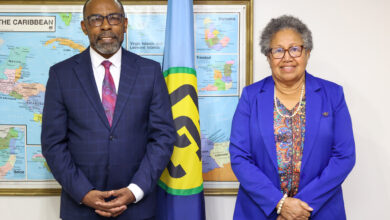|
It gives me particular pleasure to deliver these remarks at this Forum which focuses on the future of Youth in the Caribbean Community and indeed on the future of the Caribbean Community where youth under the age of 30, comprise some 60 percent of its population.
Today’s Forum is part of a process that began with the establishment of the CARICOM Commission on Youth Development by Heads of Government of CARICOM in March 2007. The Commission was tasked with the responsibility of undertaking a full scale analysis of the challenges and opportunities for youth in the CARICOM Single Market and Economy (CSME) and of making recommendations to improve their economic and social well being. The process also involved a series of studies and situational analyses, discussions of the findings of these studies by a variety of focus groups, national consultation and regional consultation engaging Ministers of Governments, other government officials, and other stakeholders including youth both in and out of school and those that are considered vulnerable and marginalized . The final Report incorporating the recommendations from the various consultations was presented to the Summit of Heads of Government on Youth Development in Suriname in January this year. The dynamism and outcome of that Meeting may yet prove to be one of the most significant events in the history of the Community. At the time that the mandate was issued, Heads of Government were concerned about increasing levels of youth risk and vulnerability and a deteriorating social and economic environment in which young people were being nurtured in the Caribbean. They believed that young people, the main beneficiaries of the integration process including the CSME, should possess that sense of citizenship, pride and regional unity which is critical to the achievement of the goals of regional integration and development process. There was, however, concern about high levels of youth marginalisation, exclusion, alienation and extra-regional migration as well as a decline in the numbers graduating from secondary and tertiary education, particularly among males. The significance of the loss of an extraordinary proportion of trained professionals and other highly skilled labour – as high as 80 percent in some cases – is untenable and has to be addressed. Heads of Government were therefore looking to the Commission to provide the baseline data and recommendations to enable Member States to design and implement targeted programmes in response to youth issues, concerns and proposals and to equip the youth population with knowledge, skills, attitudes and competencies appropriate to the demands of globalization and of community, national and regional development. The Commission’s Report, as you will hear from the presentations to follow, exceeded expectations and provided deep insight into the hopes, dreams and concerns of approximately 6,000 young people, youth workers, parents and other stakeholders across Member States and Associate Members of CARICOM who were interviewed. Their voices tell of their hopes and dreams for a united Community as well as of the pain, anger, frustration and hopelessness at the reality of their existence. Many of the issues and trends highlighted are not new but are deeper and more pervasive than was previously thought. I believe that the discussion of this Report among officials, Ministers of Government and Heads of Government in Suriname in January has been a catalyst for action. The recommendations of the Council for Human and Social Development and the Declaration of Paramaribo which resulted from the Special Summit, provide clear indications of the serious intentions of this Community to place issues relating to youth and development as priorities in the national and regional agendas. In this regard, Youth themselves – in particular those involved in the National youth Movements and in the CARICOM Youth Ambassadors Corps – must continue to make their voices heard in support of mainstreaming the recommendations from this Report into the policies and programmes intended to benefit the Youths. Today, the staff of the CARICOM Secretariat, the Ambassadors Accredited to CARICOM as well as other Members of the Diplomatic Corps in Guyana, officials of the government of Guyana and other stakeholders in Guyana have the opportunity to share their views on the Report. I am particularly pleased that we have in out midst some students from Marion Academy and look forward to wider engagements of other schools and social groups in continuing the dialogue for the advancement of youth development. The timing of this Forum is of great significance since the Secretariat is, at this moment, preparing to operationalise the Report and the outcomes of the Summit of Heads of Government and related Meetings held in Suriname in January of this year. I look forward this afternoon to fruitful discussions on the Commission’s Report. It is important that we take action. |
|




